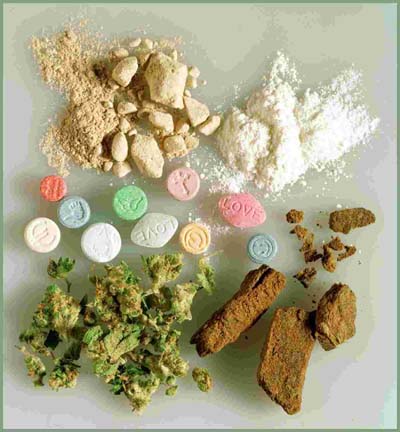Drugreporter has for some time now been hearing rumours of the possible decriminalisation of drug use in Slovakia. Unlike the Czech Republic (the country with which it was previously joined, famous for its liberal drug policy) this central-European country has until now remained one of the shrinking number of EU countries which punish simple drug possession with imprisonment.
Drug Strategy vs. Reality
Slovak media have reported on the proposed decriminalisation of illicit substances several times over the past two years. According to this news, the new law would end imprisonment for possession of small amounts of illicit drugs. Possession of small amounts would instead become a simple misdemeanour. This would apply to all substances presently listed as illicit.
 When inquiring into the driving force behind the proposal, Drugreporter heard that there had been no significant lobbying on the part of NGOs, but an increasing number of Slovak non-governmental and ministerial experts have come to recognise the validity of evidence from abroad underpinning the success of non-punitive drug policy approaches in other parts of the European Union. Another incentive for reform may have been the overcrowding in Slovakian prisons – although that was a much more pressing issue two years ago than it is today. In general, it can be said that Slovakia is keen to adopt the EU’s drug policy recommendations. When it comes to implementation, however, the country has a long road ahead.
When inquiring into the driving force behind the proposal, Drugreporter heard that there had been no significant lobbying on the part of NGOs, but an increasing number of Slovak non-governmental and ministerial experts have come to recognise the validity of evidence from abroad underpinning the success of non-punitive drug policy approaches in other parts of the European Union. Another incentive for reform may have been the overcrowding in Slovakian prisons – although that was a much more pressing issue two years ago than it is today. In general, it can be said that Slovakia is keen to adopt the EU’s drug policy recommendations. When it comes to implementation, however, the country has a long road ahead.
Iveta Chovancova, head of Odysseus, a Slovak needle exchange provider organisation, told Drugreporter: “The Slovak National Anti-Drug Strategy is very similar to the EU’s Drug Strategy. The Slovak National Anti-Drug Strategy is very similar to the EU’s Drug Strategy. Unfortunately, it has some gaps in its implementation, and neither NGOs nor drug users were involved in preparing it”.
Harm Reduction experts in Slovakia agree that there is a huge difference between what the National Anti-Drug Strategy says, and the way decisions are actually made. While the strategy supports evidence-based reduction measures, Chovancova explains that in practice, the drug policy situation in Slovakia is characterised by a lack of expertise and funding. Statistics show that funding for harm reduction measures is inadequate, uncertain, and (since 2010) on the decline.
Constantly delayed meeting of the responsible government body
Another component is that since the notion of decriminalisation first surfaced two years ago in Slovakia, there have been a number of changes within drug policy. First of all, the coordinating body has changed: Drug policy coordination used to fall under the scope of the Office of Government’s National Monitoring Centre for Drugs, but that responsibility has now been transferred to the Coordination Department of the Anti-Drugs Strategy and Monitoring of Drugs.
|
Slovak drug use in a European perspective Prevalence of Slovak drug use in general, and marijuana use levels in particular, tend toward the lower side of European norms. Overall, some 3.6% of Slovak adults, for instance, report using marijuana, compared with a European high of 10%. For young adults, the figures are 7.6% for Slovaks, compared to a European high of 18%. |
|---|
Critics argue though, that this change has not necessarily been beneficial, since the responsible department, within the Health Ministry, has less capacity or political influence, and even the number of dedicated staff has been reduced. The Office of the Government, in contrast, had greater power to act, and less bureaucracy, our source claims.
An even more significant problem though, is that the newly-created government body called the Council of Government for Anti-Drug Policy, charged with preparing the legislative amendments required for decriminalisation, has only held one meeting since it was formed. This body, chaired by the Minister for Health and composed of seven other ministers, the Attorney General, and the Government Plenipotentiary for the development of civil society, needs to come up with a document preparing the way for the planned changes. This means that the lack of meetings of this body is currently the main obstacle lying in the path of decriminalisation in Slovakia. Only after the Council of Government for Anti-Drug Policy has held its second meeting, can the necessary draft legislation be circulated among ministries in Bratislava. One critical issue related to the preparation of legislative amendments, is that the Council of Government for Anti-Drug Policy includes no civil stakeholders, which means that those who are most affected by the law have had next to zero input into the reforms.
Unpredictable regulation
In the meantime, drug users caught in Slovakia have to rely on the country's 2005 drug law, with its vague definitions of small and large quantities.
Currently, possession of drugs for personal use is defined as no more than three times one single dose, and carries a maximum three-year sentence, but officials claim that in reality, scarcely anyone is jailed for simple personal possession. Possession of a larger amount for personal consumption (defined as no more than ten times one single dose) carries a maximum five-year sentence. The following alternative penalties can be imposed on those charged with possession for personal use: suspended sentences (with or without probation supervision), enrolment in therapy, fines, monitored house arrest for up to one year, or community service of between 40 and 300 hours.
Quantities in excess of these limits result in a charge under s.172, which has a sentence range of 3-10 years if there are no aggravating factors.
A ray of hope
While experts believe that one day the Council of Government for Anti-Drug Policy will hold its long-delayed second meeting to deliver the preparatory document needed for decriminalisation, there has still been no date set for the meeting. On the other hand, it is a hopeful sign that Viliam Čislák, the new Minister of Health, is said to be fair-minded and receptive to evidence.
For the time being though, the country's drug policy reformists have to content themselves with the recent change, whereby since March 2014, marijuana seeds are no longer illegal.
György Folk / HCLU




